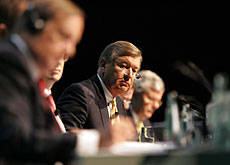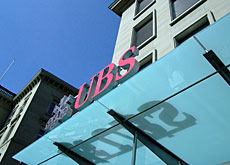“The country’s social cohesion is at stake”

The rocketing salaries of business managers and directors are "jeopardising Switzerland's social stability", according to the country's leading business organisation.
The comments by the Swiss Business Federation, economiesuisse, follow the announcement earlier this week that UBS chairman Marcel Ospel was paid SFr24 million ($18.74 million) last year.
Ospel’s hefty pay packet also came under fire from UBS shareholders at Wednesday’s annual general meeting of Switzerland’s largest bank.
“How can I justify to my students the fact that in one day a business manager earns what small farmers earn in two years?” an economics teacher asked the bank’s board of management.
“Eight-digit salaries should be outlawed,” exclaimed another shareholder.
The unusually critical comments aired at the meeting in Basel have refocused attention and rekindled people’s irritation at the gold-plated salaries paid to Switzerland’s top business managers. The salary rankings are headed by Ospel, who earns roughly SFr65,000 a day.
Doubts
These paradoxes of the free market, especially when related to the real world of people who struggle to make it to the end of the month, are beginning to sow doubts in the ranks of the middle classes.
A few days ago, Johann Schneider-Ammann, vice-president of economiesuisse and president of Swissmem, the umbrella organisation of the Swiss mechanical and electrical engineering industry, called for reason to prevail.
“Successful people must be rewarded, but in moderation,” he declared. “Otherwise, we risk losing social cohesion and solidarity.”
“Not true,” replied Beat Kappeler, an economist and leader writer for the weekly NZZ am Sonntag. “A country loses social cohesion and the poor rise up in revolt only when the most oppressed have no way out. That is the way things have been since the French Revolution.
“In Switzerland, on the other hand, there is a relatively high degree of social mobility, and almost everyone has a chance of success. The incomes of those at the top are therefore not a determining factor,” he added.
Wage capping?
Some on the political right, whom one would normally expect to support free-market economics, are even voicing proposals for a cap of SFr7.5 million a year on managers’ salaries.
They say a multiple of 100 times the average Swiss salary, which is around SFr75,000, would be more than sufficient reward for even the best manager.
“Of course we are pleased to hear them making such statements,” said Martin Flügel, spokesman on wages and salaries at a union umbrella group, Travail Suisse.
“The problem is a real one. These top managers live in a world apart; they know nothing of the difficulties of ordinary people. Then they are often at the forefront of efforts to demolish the welfare state and the provision it makes for the weaker members of society – a truly problematic development,” he explained.
The international picture
UBS, which in 2005 posted a record profit of SFr14 billion, justified its salary policy by referring to the international market for top executives.
According to UBS, remuneration for the chairmen of the boards of nine of the Swiss banking group’s principal competitors range from SFr12-49 million per annum.
In this highly exclusive club, the earnings of Marcel Ospel do not seem quite so astronomic. While UBS profits are among the highest, notes the bank, Ospel’s remuneration is more modest than most.
“Basically, deciding on Marcel Ospel’s salary is a matter exclusively for the UBS shareholders,” pointed out Beat Kappeler.
“His salary damages neither the state, nor the bank’s customers, nor its employees. These reactions are therefore very artificial, reflecting feelings of envy.”
According to Kappeler, ideology is best set aside when considering such cases.
“Equality is not of itself a valid goal. On the contrary, it may be quite mistaken if, underneath, there are different levels of performance,” he said.
swissinfo, Marzio Pescia
UBS chairman Marcel Ospel is Switzerland’s highest-paid manager: he received remuneration amounting to SFr24 million ($18.7 million) in 2005.
Close behind him are Oswald Grübel of Credit Suisse (SFr22 million) and Daniel Vasella of Novartis (SFr21.3 million).
Further down the rankings, but still multimillionaires, are Franz Humer of Roche (SFr14.7 million) and Peter Brabeck of Nestlé (SFr13.6 million).
The average annual salary in Switzerland is around SFr75,000.
A survey published by Travail Suisse last June sounded an alarm bell: the wage gap between the senior managers of Swiss multinationals and their employees is widening.
The most glaring example is that of UBS chairman Marcel Ospel, who earns 302 times as much as his bank’s least well-paid employees.
The Swiss stock-exchange rule obliging listed companies to publish the salaries of their senior managers has been in force since July 2002.
Last year parliament demanded transparency regarding the salaries of directors and senior managers in its Code of Obligations.

In compliance with the JTI standards
More: SWI swissinfo.ch certified by the Journalism Trust Initiative


You can find an overview of ongoing debates with our journalists here. Please join us!
If you want to start a conversation about a topic raised in this article or want to report factual errors, email us at english@swissinfo.ch.